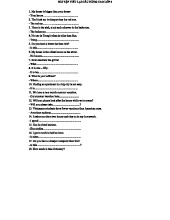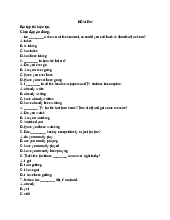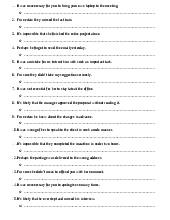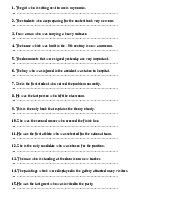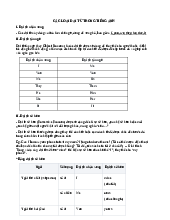







Preview text:
Lý thuyết và Bài tập Thì hiện tại đơn lớp 6 kèm bài tập áp dụng
1. Lý thuyết và Bài tập Thì hiện tại đơn chi tiết
Lý thuyết về Thì hiện tại đơn (Simple Present Tense)
Thì hiện tại đơn được sử dụng để diễn tả các hành động, sự việc thường xuyên xảy ra, thông thường hoặc
sự thật hiển nhiên. Nó cũng có thể được sử dụng để thể hiện thói quen, sở thích, sự thật khoa học, hay một
sự kiện trong tương lai theo lịch trình cố định. Cấu trúc:
Với động từ chia ở ngôi thứ ba số ít (he, she, it), thêm "s" hoặc "es" vào cuối động từ.
Với các ngôi khác, sử dụng động từ nguyên thể (V).
Sử dụng "do" (khẳng định) hoặc "do not" (phủ định) để tạo câu hỏi và câu phủ định. Dạng khẳng định: I/You/We/They + base verb (V) He/She/It + V + "s" or "es" Dạng phủ định:
I/You/We/They + do not (don't) + base verb (V)
He/She/It + does not (doesn't) + V Dạng câu hỏi:
Do + I/You/We/They + base verb (V)? Does + He/She/It + V? Ví dụ: Khẳng định: I play tennis every Saturday. She reads books before bed. They eat breakfast at 7 AM. Phủ định: He doesn't like spicy food. We don't watch much TV.
It doesn't rain a lot in this region. Câu hỏi: Do you speak English? Does he live in that house? Do they play the guitar? Bài tập:
Hoàn thành các câu sau với động từ thích hợp:
She ____________ (go) to the gym every morning.
They ____________ (study) French on Mondays and Wednesdays.
He usually ____________ (drink) coffee in the morning.
Điền đúng dạng của động từ trong ngoặc:
My cat ____________ (sleep) a lot during the day.
Tom and Jane ____________ (not like) horror movies.
Đặt câu hỏi cho câu sau: They watch movies on weekends.
Sắp xếp từ để tạo câu hoàn chỉnh: often / go / she / to the gym
Dùng thì hiện tại đơn để nói về thói quen của bạn hoặc người thân trong gia đình bạn. Đáp án: 1. goes, study, drinks 2. sleeps, don't like
3. Do they watch movies on weekends? 4. She often goes to the gym.
5. Thí sinh tự viết câu dựa trên thực tế cá nhân.
2. Bài tập vận dụng thì hiện tại đơn có đáp án chi tiết
Bài tập 1: Hoàn thành các câu sau với động từ thích hợp:
1. She goes to the gym every morning.
2. They study French on Mondays and Wednesdays.
3. He usually drinks coffee in the morning.
Bài tập 2: Điền đúng dạng của động từ trong ngoặc:
1. My cat sleeps a lot during the day.
2. Tom and Jane don't like horror movies.
Bài tập 3: Đặt câu hỏi cho câu sau: They watch movies on weekends.
Đáp án: Do they watch movies on weekends?
Bài tập 4: Sắp xếp từ để tạo câu hoàn chỉnh: often / go / she / to the gym
Đáp án: She often goes to the gym.
Bài tập 5: Dùng thì hiện tại đơn để nói về thói quen của bạn hoặc người thân trong gia đình bạn.
(Đây là phần yêu cầu bạn tự viết câu dựa trên thực tế cá nhân, vì vậy không có đáp án cụ thể.)
Bài tập 6: Điền động từ thích hợp vào chỗ trống:
1. He usually __________ (read) a newspaper in the morning.
2. My parents __________ (live) in a small town.
3. They __________ (play) soccer on Saturdays.
4. She __________ (watch) documentaries about nature.
5. I __________ (not eat) meat because I'm a vegetarian.
Bài tập 7: Hoàn thành câu hỏi bằng cách sử dụng động từ thích hợp:
1. __________ you like to swim in the ocean?
2. __________ he work at the hospital?
3. __________ they speak Spanish fluently?
4. __________ she usually go to the gym?
5. __________ we need to bring anything to the party?
Bài tập 8: Sắp xếp các từ để tạo câu hoàn chỉnh:
usually / up / I / wake / at / 7 AM.
Bài tập 9: Hoàn thành đoạn văn sau bằng cách điền động từ thích hợp:
Every summer, my family and I __________ (go) to the beach. We __________ (rent) a small cottage near
the shore. During the day, we __________ (swim) in the ocean and __________ (build) sandcastles. In the
evening, we usually __________ (have) a barbecue and __________ (watch) the sunset. It's a wonderful
time for us to relax and enjoy each other's company. Đáp án: Bài tập 6: 1. reads 2. live 3. play 4. watches 5. don't eat Bài tập 7: 1. Do 2. Does 3. Do 4. Does 5. Do Bài tập 8: I usually wake up at 7 AM.
Bài tập 9: Every summer, my family and I go to the beach. We rent a small cottage near the shore. During
the day, we swim in the ocean and build sandcastles. In the evening, we usually have a barbecue and watch
the sunset. It's a wonderful time for us to relax and enjoy each other's company.
Bài tập 10: Hoàn thành đoạn văn sau bằng cách điền động từ thích hợp:
My friend Alex __________ (work) as a teacher. He __________ (teach) English to elementary school
students. He __________ (enjoy) working with children and he __________ (feel) fulfilled when he sees
them learn and grow. Alex usually __________ (start) his classes at 9 AM and __________ (finish) at 3 PM.
After work, he __________ (spend) time reading and preparing for the next day's lessons.
Bài tập 11: Sắp xếp các từ để tạo câu hoàn chỉnh:
not / eat / he / breakfast / usually.
Bài tập 12: Hoàn thành các câu sau với động từ thích hợp:
1. She __________ (visit) her grandparents every Sunday.
2. We __________ (play) board games on Friday nights.
3. He __________ (not like) to watch horror movies.
4. They __________ (study) math at the library.
5. Does she __________ (read) magazines regularly?
Bài tập 13: Viết câu phủ định và câu hỏi cho các câu sau:
1. She reads science fiction novels.
2. They watch TV in the evening.
3. He goes to the gym three times a week.
Bài tập 14: Viết câu với "usually" hoặc "always" ở đúng vị trí: 1. I watch movies. (usually)
2. She arrives on time. (always) 3. They play soccer. (usually) Đáp án: Bài tập 10:
works, teaches, enjoys, feels, starts, finishes, spends Bài tập 11:
He usually does not eat breakfast. Bài tập 12: 1. visits 2. play 3. doesn't like 4. study 5. Does she read Bài tập 13:
1. Phủ định: She doesn't read science fiction novels. Câu hỏi: Does she read science fiction novels?
2. Phủ định: They don't watch TV in the evening. Câu hỏi: Do they watch TV in the evening?
3. Phủ định: He doesn't go to the gym three times a week. Câu hỏi: Does he go to the gym three times a week? Bài tập 14: 1. I usually watch movies. 2. She always arrives on time. 3. They usually play soccer.
Bài tập 15: Điền động từ thích hợp vào chỗ trống:
1. Mary __________ (read) a book every evening.
2. The sun __________ (rise) in the east.
3. My father __________ (work) as an engineer.
4. They __________ (not believe) in ghosts.
5. Tom __________ (not smoke) cigarettes.
Bài tập 16: Sắp xếp các từ để tạo câu hoàn chỉnh:
always / takes / she / the bus / to work.
Bài tập 17: Hoàn thành đoạn văn sau bằng cách điền động từ thích hợp:
John __________ (travel) a lot for his job. He __________ (visit) different countries and __________ (meet)
new people. He __________ (enjoy) experiencing different cultures and trying new foods. John usually
__________ (fly) to his destinations, but sometimes he __________ (take) trains or buses. He __________
(not have) a regular office job, so his schedule is quite flexible.
Bài tập 18: Hoàn thành các câu sau bằng cách sử dụng động từ thích hợp:
1. She __________ (not watch) TV in the morning.
2. How often __________ you __________ (exercise)?
3. __________ he __________ (play) the piano well?
4. My friends __________ (visit) me every summer.
5. They __________ (usually have) dinner at 7 PM.
Bài tập 19: Viết một đoạn văn ngắn về thói quen hàng ngày của bạn bằng Thì hiện tại đơn. Đáp án: Bài tập 15: 1. reads 2. rises 3. works 4. don't believe 5. doesn't smoke Bài tập 16:
She always takes the bus to work.
Bài tập 17: John travels a lot for his job. He visits different countries and meets new people. He enjoys
experiencing different cultures and trying new foods. John usually flies to his destinations, but sometimes he
takes trains or buses. He doesn't have a regular office job, so his schedule is quite flexible. Bài tập 18:
1. She doesn't watch TV in the morning. 2. How often do you exercise?
3. Does he play the piano well?
4. My friends visit me every summer.
5. They usually have dinner at 7 PM.
Bài tập 19: (Đây là phần yêu cầu bạn viết dựa trên kinh nghiệm cá nhân, không có đáp án cụ thể.)
Bài tập 20: Điền động từ thích hợp vào chỗ trống:
1. She __________ (work) at a hospital as a nurse.
2. My dog __________ (bark) loudly at strangers.
3. They __________ (not play) video games during the week.
4. He __________ (study) English every evening.
5. The shop __________ (open) at 9 AM and __________ (close) at 6 PM.
Bài tập 21: Sắp xếp các từ để tạo câu hoàn chỉnh: She / not / eat / vegetables.
Bài tập 22: Hoàn thành đoạn văn sau bằng cách điền động từ thích hợp:
My sister __________ (read) a lot of books. She __________ (enjoy) fiction and mystery novels the most.
Every weekend, she __________ (go) to the library to borrow new books. She __________ (spend) hours
reading in her room. My sister also __________ (write) book reviews on her blog. She __________ (have) a
collection of bookmarks and __________ (use) them while reading.
Bài tập 23: Hoàn thành các câu sau bằng cách sử dụng động từ thích hợp:
1. He __________ (not play) the guitar.
2. How often __________ she __________ (go) to the gym?
3. __________ they __________ (visit) their grandparents every month?
4. She __________ (usually cook) dinner for her family.
5. The train __________ (arrive) at 7:30 AM.
Bài tập 24: Viết một đoạn văn ngắn về một người bạn hoặc thành viên trong gia đình của bạn dựa trên thói
quen hàng ngày của họ, sử dụng Thì hiện tại đơn. Đáp án: Bài tập 20: 1. works 2. barks 3. don't play 4. studies 5. opens, closes Bài tập 21: She does not eat vegetables.
Bài tập 22: My sister reads a lot of books. She enjoys fiction and mystery novels the most. Every weekend,
she goes to the library to borrow new books. She spends hours reading in her room. My sister also writes
book reviews on her blog. She has a collection of bookmarks and uses them while reading. Bài tập 23: 1. He doesn't play the guitar.
2. How often does she go to the gym?
3. Do they visit their grandparents every month?
4. She usually cooks dinner for her family.
5. The train arrives at 7:30 AM.
Bài tập 24: (Đây là phần yêu cầu bạn viết dựa trên kinh nghiệm cá nhân, không có đáp án cụ thể.)
